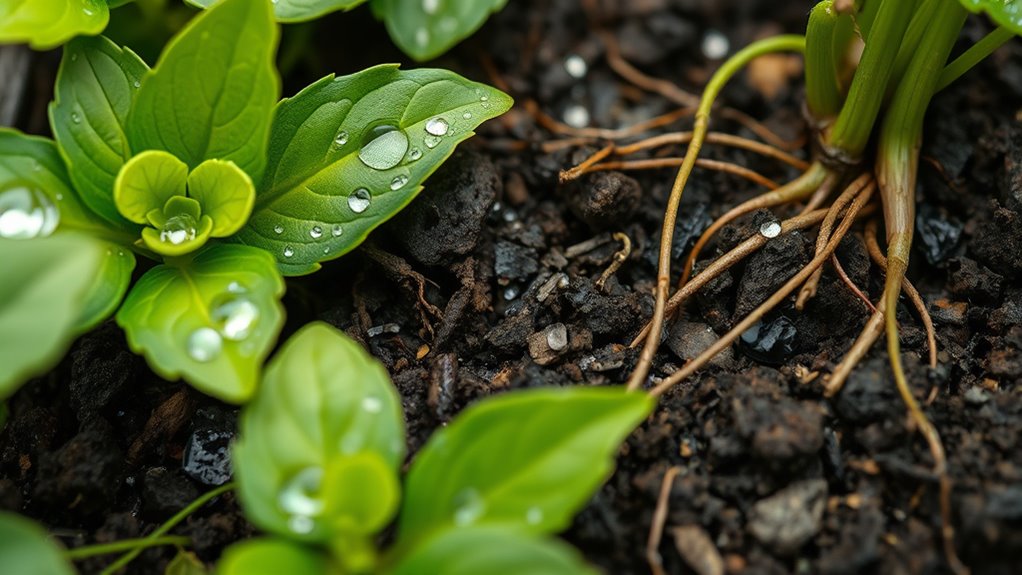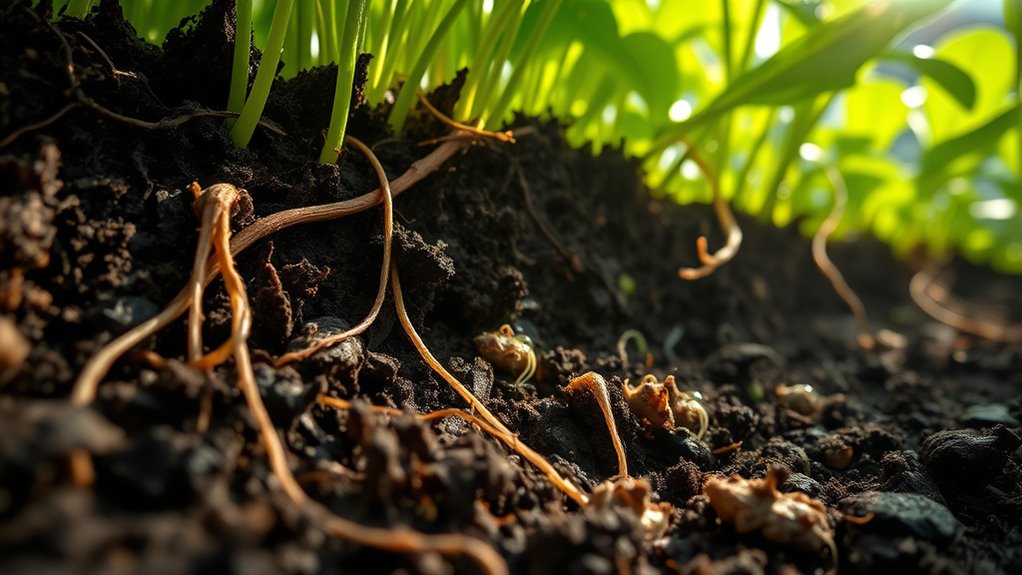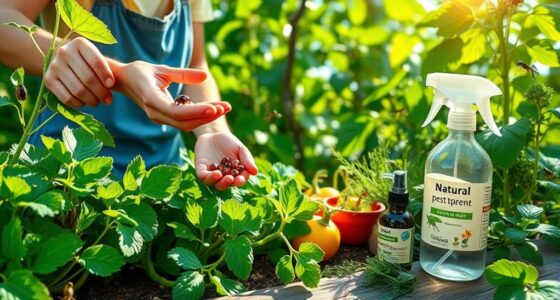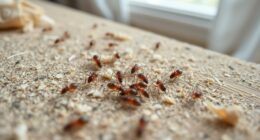Meet your garden’s bodyguards—beneficial nematodes. These tiny, natural worms underground hunt and kill pests like beetle larvae, grubs, and root maggots, all without chemicals or harmful residues. They work silently beneath the soil, helping promote healthier plants and soils while supporting beneficial microorganisms. Easy to use and safe for kids, pets, and pollinators, they’re a smart, eco-friendly pest control choice. Want to discover how to keep your garden pest-free naturally? Keep exploring!
Key Takeaways
- Beneficial nematodes are microscopic worms that naturally target and eliminate soil-dwelling pests like beetle larvae and grubs.
- They promote soil health by supporting beneficial microorganisms and maintaining a balanced ecosystem.
- Apply nematodes when soil is moist and temperatures are between 55-85°F for maximum effectiveness.
- Regular, ongoing applications help prevent pest infestations and protect plants underground.
- These natural predators are safe for kids, pets, pollinators, and leave no toxic residues, making them eco-friendly garden bodyguards.

Have you ever considered natural methods to protect your garden from pests? If you’re looking for an eco-friendly solution, beneficial nematodes could be just what you need. These microscopic worms are powerful allies in pest control, targeting a variety of soil-dwelling pests without resorting to chemical pesticides. They work underground, hunting down pests like beetle larvae, grubs, and root maggots, which can cause significant damage to your plants. By adding beneficial nematodes to your garden, you can reduce pest populations naturally, keeping your plants healthy and thriving.
One of the biggest advantages of using beneficial nematodes is that they promote soil health. Unlike chemical treatments, which can harm beneficial microorganisms, nematodes are a natural part of the soil ecosystem. They help maintain a balanced environment by keeping pest populations in check, which in turn supports the growth of healthy roots and plants. When your soil is healthy, your garden’s overall resilience improves, making it less vulnerable to future pest invasions. Plus, beneficial nematodes don’t leave toxic residues, so they’re safe for kids, pets, and beneficial insects like pollinators.
Beneficial nematodes promote soil health and are safe for kids, pets, and pollinators.
Getting started with beneficial nematodes is straightforward. You’ll want to purchase them from a reputable supplier, ensuring they’re alive and active. They usually come in a liquid suspension that you can easily apply with a spray or watering can. It’s best to use them when the soil is moist, which helps the nematodes move freely and find their targets. Timing is vital—apply them during the cooler parts of the day or when the soil temperature is between 55 and 85 degrees Fahrenheit, as extreme heat or cold can reduce their effectiveness. Once applied, the nematodes will actively seek out pests, penetrating their bodies and killing them within a few days.
Using beneficial nematodes is an ongoing process but offers long-term benefits. Regular applications can keep pest populations under control and prevent infestations from escalating. Because they work beneath the surface, they don’t interfere with your gardening activities or the aesthetic appeal of your garden beds. Additionally, they help foster a healthy soil environment, which is essential for the growth of strong, productive plants. Embracing this natural pest control method not only protects your garden but also contributes to a more sustainable and environmentally friendly gardening practice. So, if you’re ready to take a proactive step toward pest management, beneficial nematodes could become your garden’s quiet bodyguards, working tirelessly beneath the soil to guarantee your garden stays healthy and pest-free.
A healthy soil environment supports a diverse microbial community, which is vital for overall ecosystem health.
Frequently Asked Questions
Are Beneficial Nematodes Effective Against All Types of Garden Pests?
Beneficial nematodes are effective against many soil-dwelling pests, but their pest specificity means they don’t target all garden pests. They work best on larvae and grubs, but nematode limitations prevent them from controlling pests outside the soil or above ground. To get the best results, identify your pests accurately and understand that nematodes are just one part of an integrated pest management strategy.
How Long Does It Take to See Results After Applying Nematodes?
Imagine planting seeds that slowly bloom into vibrant flowers—you’re enthusiastic to see the transformation. After applying nematodes, the application timeline varies, but typically, you might notice visible signs of pest control within a few days to a week. Patience is key, as nematodes work quietly underground. For best results, monitor your garden regularly and give it time to reveal the natural pest management magic.
Can Beneficial Nematodes Harm Beneficial Insects in My Garden?
You might wonder if beneficial nematodes harm beneficial insects. Rest assured, they’re designed for beneficial insect safety, with minimal non-target effects. These nematodes specifically target soil-dwelling pests, so beneficial insects like pollinators and predators usually aren’t affected. Using them responsibly, you can protect your garden’s health without risking harm to helpful insects, making beneficial nematodes a safe, eco-friendly pest control option.
What Is the Best Time of Year to Apply Nematodes?
Timing your efforts wisely is like choosing the right moment to whisper secrets to your garden. For beneficial nematodes, the best timing is during mild, moist conditions, often in early spring or late summer. Seasonal application works best when soil temperatures are between 55-85°F. Applying during these periods ensures nematodes thrive, effectively targeting pests while your garden remains vibrant and healthy. Trust these natural allies to work their magic at the right time.
Are There Any Plants That Should Be Avoided When Using Nematodes?
Some plants may be more sensitive to beneficial nematodes due to their plant sensitivity or nematode compatibility. Avoid applying nematodes to plants like petunias, tomatoes, or spinach, which can be more susceptible to damage or stress. It’s best to verify each plant’s compatibility before treatment. Generally, hardy plants like grasses or perennials handle nematodes well, but always research specific plant sensitivities to ensure safe and effective application.
Conclusion
With beneficial nematodes on your side, your garden becomes an unstoppable fortress against pests. These tiny warriors work tirelessly, outnumbering and outsmarting even the craftiest bugs. By introducing them, you’re harnessing nature’s own army—more powerful than a swarm of superheroes—to protect your plants. So, don’t wait for pests to invade—arm your garden now with these microscopic bodyguards and watch your plants thrive like never before! Your garden’s safety has truly never been this easy.









